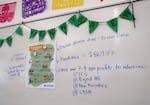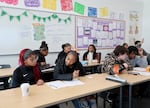At the start of each class, Melissa Kennybrew and her students at Benson Polytechnic High School in Northeast Portland recite the poem "In Lak’ech," part of a larger work by the Chicano playwright Luis Valdez:
“— Luis ValdezTú eres mi otro yo. You are my other me.
Si te hago daño a ti, If I do harm to you,
Me hago daño a mi mismo. I do harm to myself.
Si te amo y respeto, If I love and respect you,
Me amo y respeto yo. I love and respect myself.”
Her students memorize the poem and repeat it at the start of every class. Kennybrew said it’s a reminder that they are a community; how they treat others reflects how they feel about themselves.
That same spirit of compassion is behind her junior AVID elective class in their work with Schnitzer Cares: Student Grantmaking.
Previously known as CommuniCare, Student Grantmaking exposes students to hands-on work, researching and distributing grants for causes they care about.
Students in participating groups spend the school year identifying an issue in their community, along with possible solutions. They raise money, interview nonprofits and ultimately select who they want to award the money.
Kristen Engfors-Boess, program director of Schnitzer Cares: Student Grantmaking, said it can be hard to make the jump from being students to the ones calling the shots.
But this program, she said, “gives them the opportunity to flex these muscles — this compassion, this agency, this teamwork — that are going to serve them in whatever their next step is in college or career.”

A whiteboard in Melissa Kennybrew's classroom at Benson Polytechnic High School in Portland, Ore., on Feb. 28, 2025, shows the steps the class has taken to fundraise money to help youth aging out of the foster care system. Their work is part of the Schnitzer Cares: Student Grantmaking program.
Natalie Pate / OPB
In its first 27 years, Schnitzer Cares students have given out over $5.2 million to more than 560 nonprofit organizations and other school programs. Currently, 70 grantmaking groups from 42 different schools — collectively representing roughly 1,600 students across the state — make up the program.
There are similar programs elsewhere in Oregon and across the U.S., but Engfors-Boess said Student Grantmaking is one of the largest in the country when it comes to money and the number of participating students.
“If the goal is to have a society that works for everybody,” she said, “we need people who really are community-minded, and who can take their seat at the table and work with others.”
The first time Kennybrew took part three years ago, she says she was blown away watching 16- and 17-year-olds put things like “grantfunding” on their resumes, all before graduating from high school.
“It was such a big deal,” she said through a laugh. “I don’t even have that on my resume. You know what I mean?”

Juniors in Melissa Kennybrew's class at Benson Polytechnic High School in Portland, Ore., discuss their Schnitzer Cares: Student Grantmaking work on Feb. 28, 2025.
Natalie Pate / OPB
Kennybrew’s first Schnitzer Cares cohort wanted to help address domestic violence. The next year, they chose gun violence. This year, it’s foster care.
“They feel safe talking about the issues that are important to them,” Kennybrew said, adding that a lot of them have experienced these things firsthand.
There were more than 3,170 students in foster care enrolled in Oregon schools in 2023-24. State data shows that students across all age groups can go into foster care; however, placement rates are highest among very young children — kindergarteners and first graders — and then decline through sixth grade. Placement rates climb again during middle school and peak in high school.
Students in the foster care system are more likely to miss school, and they have one of the lowest four-year graduation rates of any student subgroup, second only to students who have been incarcerated.
The 23 students in Kennybrew’s junior class are especially worried about what happens when students “age out” of the foster care system.
Young people can only be in foster care in Oregon until they’re 21. Although the state offers a handful of services to foster-impacted youth until they’re 24, the students at Benson argue there’s not enough support for these teens through a difficult transition.
Kennybrew’s students want to use the more than $15,800 they’ve raised and matched this year to ensure this often vulnerable and overlooked population has what they need.

Han Quach, left, talks with fellow students during class on Feb. 28, 2025, at Benson Polytechnic High School in Portland, Ore. Quach is part of the junior AVID elective class participating with Schnitzer Cares: Student Grantmaking to raise money and awareness around issues in their communities.
Natalie Pate / OPB
“I feel like foster care is never brought up, even when people are talking about those that are marginalized,” student Han Quach said. “I feel like even then, foster care kids aren’t talked about at all.”
This is despite the fact that many key issues are often connected with foster care.
“You see abuse a lot, homelessness a lot. And I think a lot of the time, it ties into foster care,” said junior Makaila Garcia-Taylor, adding that when the class looked at the issue of foster care in Portland, it was worse than they could have imagined.
Quach said the class really wanted to help kids their own age. It made it feel more personal, especially as fellow students at Benson are affected by ongoing news about immigration and other topics.
“A lot of us … can relate, maybe not personally, or maybe we do know somebody … impacted by current events,” they said. “It just really hit home for all of us, and we really wanted to give back in any way we could.”

Benson Polytechnic High School in Portland, Ore., on Feb. 28, 2025.
Natalie Pate / OPB
Benson junior NyAsia Wright pushed hard for foster care to be the issue the class tackled this year, knowing that the people who will benefit from these programs are possibly in school with them.
“I remember in elementary school, I had a friend, and she was going through the foster care system with her little sister, struggling from home to home,” Wright recalled. “She would always talk to me about missing her mom and wanting to get back home, and that kind of inspired me to do this.”
The students used various tactics — half-court basketball shots and selling Krispy Kreme donuts — to raise their portion of the money. Other groups in the program have hosted drive-in movie nights or put on a “Hot Ones” event with their teachers, inspired by the famous wings-eating talk show, to raise money.
Schnitzer Cares gives each group $200 in seed money to get started, which they have to make up before they count their profit. They’re guaranteed $7,500 to award to the nonprofits no matter what. But if the students fundraise at least $750 on their own, Schnitzer Cares doubles the award, and they get to add whatever money they collected to the pot.
Kennybrew’s students exceeded that required minimum, giving them thousands more to give away. They will also get to decide whether to use a portion of their total to create a scholarship for a Benson senior.

Salihat Abdalla, a junior at Benson Polytechnic High School in Portland, Ore., writes out her thoughts during class on Feb. 28, 2025. Abdalla is part of the class raising money for youth aging out of the foster care system through their work with Schnitzer Cares: Student Grantmaking.
Natalie Pate / OPB
As far as deciding which nonprofits to award the money, students Quach, Brenda Martinez-De Jesus and Salihat Abdalla gave examples of what the class is looking for.
They said they want to make sure the organizations help with things such as housing, food, clothes, academic support, legal advice, mental and physical health, and other needs of youth aging out of the system. Abdallah said if these young adults have help and are checked on when they’re older, they might not feel so alone.
Earlier this year, the class narrowed their choice down to four options. This month, they’ll decide who gets the money.
“This is probably the first time in my life where I’ve gotten to do something remotely close to this. It feels awesome,” Quach said. “The adults were the supporting roles for once. And it just felt really nice to be heard and to be able to give voices to people that are our age as well.”
When Kennybrew thinks about how powerful it is for the students to be the ones calling the shots, she said it makes her emotional.
She always wants her students to feel empowered and “like they can make a difference.” She said this program makes that a reality.
The Harold & Arlene Schnitzer CARE Foundation and its president, Jordan Schnitzer, are contributors to OPB.
